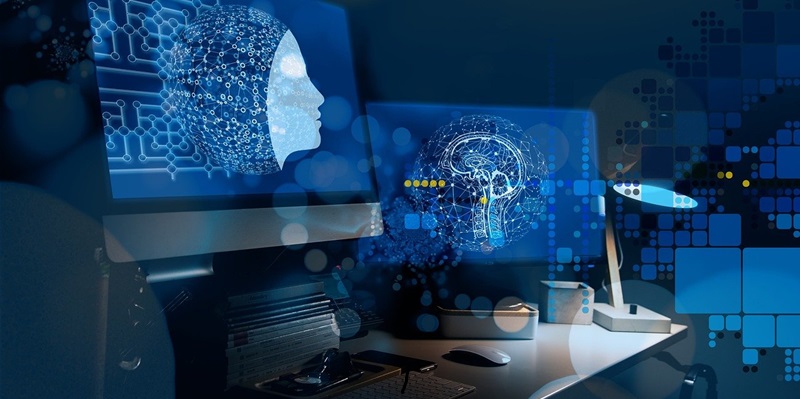The Tony Blair Institute (TBI) has conducted an in-depth evaluation of AI’s impact on the workforce, highlighting its transformative potential as well as its forthcoming challenges. The report asserts that AI, much like past technological advancements from the agricultural revolution to the digital age, is set to significantly reshape labor markets. When fully adopted by UK firms, AI could notably increase productivity, potentially saving “almost a quarter of private-sector workforce time,” which equates to the annual output of six million workers. These gains are particularly expected from AI’s capability to automate cognitive tasks such as data analysis and administrative operations.
The TBI report identifies certain sectors as more vulnerable to AI disruption than others. Fields reliant on routine cognitive work, such as banking and finance, face significant exposure, whereas sectors requiring complex manual tasks, like skilled trades or construction, are likely to experience less direct impact. Despite initial job losses, AI is predicted to spur economic growth and create new industries, eventually balancing job displacement through the creation of new employment opportunities—a trend historically observed with technological advancements. However, the transition period might be marked with considerable upheaval, requiring proactive measures to ensure a smoother shift.
Sector-specific Impacts of AI
Certain industries are more prone to AI disruptions than others. Banking and finance, with their heavy reliance on routine cognitive work, stand on the front lines of this shift. Processes like data entry, customer service, and even some analytical tasks are increasingly being automated. This is leading to concerns about job security for workers in these fields, as AI can perform these tasks more efficiently and accurately. On the flip side, industries involving complex manual tasks, such as skilled trades and construction, are comparatively insulated from immediate AI encroachments. These jobs require a level of dexterity, problem-solving, and adaptability that current AI technologies struggle to replicate.
Moreover, industries that typically have high levels of repetitive and predictable tasks are also at risk. Customer service is another domain experiencing AI’s transformative effects. Chatbots and automated response systems are becoming more prevalent, handling inquiries and service requests that previously required human intervention. In contrast, roles that demand creativity, emotional intelligence, and complex decision-making are less likely to be automated soon. Despite this, overall economic growth linked to AI implementation could eventually generate new job opportunities, potentially offsetting some of the initial job losses.
Benefits in Education and Healthcare
AI’s potential beneficial impact extends into education and healthcare. In education, AI could improve learning outcomes by personalizing education and supporting both students and teachers. AI-driven tools can provide tailored tutoring, adapt to individual learning paces, and identify areas where students might be struggling. This personalized approach has the potential to raise overall educational attainment by around six percent on average. Additionally, AI can assist educators by automating administrative tasks, allowing them to focus more on teaching and personal student interactions.
In healthcare, AI’s capabilities promise to revolutionize the sector. AI-based applications can expedite medical research, enabling quicker and more accurate diagnoses and treatment plans. Preventive care also stands to benefit significantly, with AI systems analyzing vast amounts of data to predict and prevent health issues before they become critical. Moreover, AI can play a crucial role in helping individuals with disabilities re-enter the workforce, offering them tools and support to overcome their limitations. By supporting overall workforce health and reducing welfare costs, AI could contribute to a more efficient and inclusive healthcare system.
Addressing Potential Challenges
However, the report also acknowledges potential workplace challenges associated with AI. Increased monitoring and stress from AI tools might arise, necessitating thoughtful management to ensure a more engaging, inclusive, and safe working environment. Employees could experience anxiety due to constant performance tracking or pressure to meet AI-calculated efficiency metrics. To mitigate these issues, the TBI outlines several recommendations. Upgrading labor-market infrastructure is crucial, including using AI for job matching and creating an “Early Awareness and Opportunity System” to help workers understand AI’s impact on their jobs and navigate career paths.
Preparing for an AI-powered future requires policy changes to maximize AI benefits while addressing its risks. Incentivizing AI adoption across industries, developing AI pathfinder programs, and creating challenge prizes to tackle public-sector labor shortages are some of the proposed measures. Such policies aim to foster a dynamic and resilient economy. Policymakers are encouraged to adopt a “pro-innovation” stance, balancing the drive for technological advancement with careful consideration of associated risks. This approach is essential to harness AI’s transformative power while minimizing potential downsides.
Conclusion: Navigating the AI Transition
The Tony Blair Institute (TBI) has conducted a comprehensive study on the impact of AI on the workforce, underscoring both its transformative potential and upcoming challenges. The report suggests that AI, like previous technological revolutions, is poised to drastically reshape labor markets. When fully implemented by UK businesses, AI could significantly boost productivity, saving nearly "a quarter of private-sector workforce time,” equivalent to the annual output of six million workers. These productivity gains are expected from AI’s ability to automate cognitive tasks, such as data analysis and administrative duties.
The TBI report highlights that certain sectors are more susceptible to AI disruption. Industries dependent on routine cognitive tasks, like banking and finance, might face substantial challenges, while fields requiring intricate manual labor, such as skilled trades or construction, are likely to feel less immediate impact. Although initial job losses are anticipated, AI is expected to drive economic growth and foster new industries, eventually offsetting job displacement with new opportunities. However, the transition period could be turbulent, necessitating proactive measures to facilitate a smoother adjustment.

